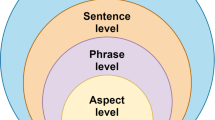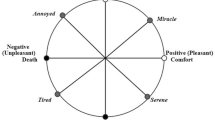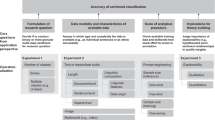Abstract
The opinion conveyed by the user towards the movie can be understood by sentiment analysis of the movie review. In the current work we focus on finding the aspects of a movie review which direct its polarity the most. This is achieved using certain driving factors, which are scores given to the various movie aspects. Generally its found that aspects with high driving factors affect the review polarity the most.


Similar content being viewed by others
References
Basaria ASH, Hussina B, Anantaa IGP, Zeniarjab J (2012) Opinion mining of movie review using hybrid method of support vector machine and particle swarm optimization. In: Malaysian Technical Universities conference on engineering & technology (MUCET 2012) part 4: information and communication technology
Bro J, Ehrig H (2010) Generating a context-aware sentiment lexicon for aspect-based product review mining. In: IEEE/WIC/ACM international conference on web intelligence and intelligent agent technology
Kang H, Yoo SJ, Han D (2012) Senti-lexicon and improved Naive Bayes algorithms for sentiment analysis of restaurant reviews. Expert Syst Appl 39(5):6000–6010
Large Movie Review Dataset (2015) Acquired from stanford AI lab. http://ai.stanford.edu/~amaas/data/sentiment
Maas AL, Daly RE, Pham PT, Huang D, Ng AY, Potts C (2011) Learning word vectors for sentiment analysis. In: Proceedings of the 49th annual meeting of the association for computational linguistics: human language technologies
Pang B, Lee L, Vaithyanathan S (2002) Thumbs up? Sentiment classification using machine learningtechniques. In: Proceedings of the conference on empirical methods in natural language processing (EMNLP), Philadelphia, pp 79–86
Parkhe V, Biswas B (2014) Aspect based sentiment analysis of movie reviews: finding the polarity directing aspects. In: Proceedings of international conference on soft computing and machine intelligence 2014
Sentiment Analysis (2015) Wikipedia-the free encyclopedia. http://wikipedia.org/wiki/Sentiment_analysis
SentiWordNet (2015) Lexical resource for opinion mining. http://sentiwordnet.isti.cnr.it
Singh VK, Piryani R, Uddin A, Waila P (2013) Sentiment analysis of movie reviews a new feature-based heuristic for aspect-level sentiment classification. In: Proceedings of the 2013 international muli-conference on automation, communication, computing, control and compressed sensing, Kerala-India, IEEE Xplore, pp 712–717
Stanford Part-Of-Speech Tagger (2015) Stanford natural language processing group. http://nlp.stanford.edu/software/tagger.shtml
Taboada M, Brook J, Stede M (2009) Genre-based paragraph classification for sentiment analysis. In: Proceedings of SIGDIAL 2009: the 10th annual meeting of the special interest group in discourse and dialogue, University of London, Queen Mary, pp 62–70
Thet TT, Na J-C, Khoo CSG (2010) Aspect-based sentiment analysis of movie reviews on discussion boards. J Inf Sci 36(6):823–848
Yu J, Zha Z-J, Wang M, Chua T-S (2011) Aspect ranking: identifying important product aspects from online consumer reviews. In: Proceedings of the 49th annual meeting of the association for computational linguistics, Portland, Oregon, pp 1496–1505, 19–24 June 2011
Acknowledgments
The above work is an extension of previous work published in ISCMI 2014 (Parkhe and Biswas 2014). Proper citations have been included for the same in the above work for transparency purposes.
Author information
Authors and Affiliations
Corresponding author
Ethics declarations
Conflict of interest
The authors declare that they have no conflict of interest
Informed consent
Also Informed consent was obtained from all individual participants included in the study. This article does not contain any studies with human participants or animals performed by any of the authors.
Additional information
Communicated by S. Deb, T. Hanne and S. Fong.
Rights and permissions
About this article
Cite this article
Parkhe, V., Biswas, B. Sentiment analysis of movie reviews: finding most important movie aspects using driving factors. Soft Comput 20, 3373–3379 (2016). https://doi.org/10.1007/s00500-015-1779-1
Published:
Issue Date:
DOI: https://doi.org/10.1007/s00500-015-1779-1




